Simone Weil


Simone Adolphine Weil (3 February 1909 – 24 August 1943) was a French social and religious philosopher, and Christian mystic. Politically active, during the Spanish Civil War she joined the Anarchist military unit known as the Durruti Column, and took part in the French Resistance during World War II. She was the sister of mathematician André Weil, with whom she shared an interest in ancient Greek and Indian thought.
Quotes[edit]



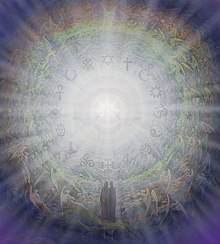


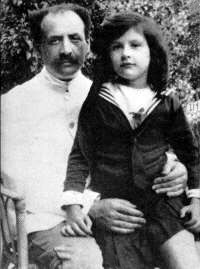
- Art is the symbol of the two noblest human efforts: to construct and to refrain from destruction.
- The Pre-War Notebook (1933-1939), published in First and Last Notebooks (1970) edited by Richard Rees
- The prospects of revolution seem therefore quite restricted. For can a revolution avoid war? It is, however, on this feeble chance that we must stake everything or abandon all hope. An advanced country will not encounter, in the case of revolution, the difficulties which in backward Russia served as a base for the barbarous regime of Stalin. But a war of any scope will give rise to others as formidable.
- "Reflections on War" (1933); also in Formative Writings (2009)
- I have sometimes told myself that if only there were a notice on church doors forbidding entry to anyone with an income above a certain figure, and a low one, I would be converted at once.
- Letter to Georges Bernanos (1938), in Seventy Letters, as translated by Richard Rees (Wipf and Stock: 1965), p. 105
- Attention is the rarest and purest form of generosity.
- Original: L’attention est la forme la plus rare et la plus pure de la générosité.[1]
- From an April 13, 1942 letter to poet Joë Bousquet, published in their collected correspondence (Correspondance [Lausanne: Editions l'Age d'Homme, 1982], p. 18).
- Wrongly or rightly you think that I have a right to the name of Christian. I assure you that when in speaking of my childhood and youth I use the words vocation, obedience, spirit of poverty, purity, acceptance, love of one's neighbor, and other expressions of the same kind, I am giving them the exact signification they have for me now. Yet I was brought up by my parents and my brother in a complete agnosticism, and I never made the slightest effort to depart from it; I never had the slightest desire to do so, quite rightly, I think. In spite of that, ever since my birth, so to speak, not one of my faults, not one of my imperfections really had the excuse of ignorance. I shall have to answer for everything on that day when the Lamb shall come in anger.
You can take my word for it too that Greece, Egypt, ancient India, and ancient China, the beauty of the world, the pure and authentic reflections of this beauty in art and science, what I have seen of the inner recesses of human hearts where religious belief is unknown, all these things have done as much as the visibly Christian ones to deliver me into Christ's hands as his captive. I think I might even say more. The love of these things that are outside visible Christianity keeps me outside the Church... But it also seems to me that when one speaks to you of unbelievers who are in affliction and accept their affliction as a part of the order of the world, it does not impress you in the same way as if it were a question of Christians and of submission to the will of God. Yet it is the same thing.- Last letter to Father Joseph-Marie Perrin, from a refugee camp in Casablanca (26 May 1942), as translated in The Simone Weil Reader (1957) edited by George A. Panichas, p. 111
- Concern for the symbol has completely disappeared from our science. And yet, if one were to give oneself the trouble, one could easily find, in certain parts at least of contemporary mathematics... symbols as clear, as beautiful, and as full of spiritual meaning as that of the circle and mediation. From modern thought to ancient wisdom the path would be short and direct, if one cared to take it.
- The Need for Roots (1949), p. 292
- La culture est un instrument manié par des professeurs pour fabriquer des professeurs qui à leur tour fabriqueront des professeurs.[2]
- Translation: Culture is an instrument wielded by professors to manufacture professors, who, when their turn comes, will manufacture professors.[3]
- The Need for Roots, part 2: Uprootedness, chapter 1: Uprootedness in the Towns (1949)
- Love is not consolation, it is light.
- As quoted in Simone Weil (1954) by Eric Walter Frederick Tomlin, p. 47
- Religion in so far as it is a source of consolation is a hindrance to true faith; and in this sense atheism is a purification. I have to be an atheist with that part of myself which is not made for God. Among those in whom the supernatural part of themselves has not been awakened, the atheists are right and the believers wrong.
- "Faiths of Meditation; Contemplation of the divine" as translated in The Simone Weil Reader (1957) edited by George A. Panichas, p. 417
- That is why St. John of the Cross calls faith a night. With those who have received a Christian education, the lower parts of the soul become attached to these mysteries when they have no right at all to do so. That is why such people need a purification of which St. John of the Cross describes the stages. Atheism and incredulity constitute an equivalent of such a purification.
- "Faiths of Meditation; Contemplation of the divine" as translated in The Simone Weil Reader (1957) edited by George A. Panichas, p. 418
- Whenever one tries to suppress doubt, there is tyranny.
- Lectures in philosophy [Leçons de philosophie] (1959) as translated by Hugh Price p. 103
- There are two atheisms of which one is a purification of the notion of God.
- As quoted in The New Christianity (1967) edited by William Robert Miller
- The number 2 thought of by one man cannot be added to the number 2 thought of by another man so as to make up the number 4.
- Oppression and Liberty (1958), p. 82
Prelude to Politics (1943)[edit]
- As translated in The Simone Weil Reader (1957) edited by George A. Panichas

- Maurras, with perfect logic, is an atheist. The Cardinal [Richelieu], in postulating something whose whole reality is confined to this world as an absolute value, committed the sin of idolatry. … The real sin of idolatry is always committed on behalf of something similar to the State.
- p. 199
- Our patriotism comes straight from the Romans. This is why French children are encouraged to seek inspiration for it in Corneille. It is a pagan virtue, if these two words are compatible. The word pagan, when applied to Rome, early possesses the significance charged with horror which the early Christian controversialists gave it. The Romans really were an atheistic and idolatrous people; not idolatrous with regard to images made of stone or bronze, but idolatrous with regard to themselves. It is this idolatry of self which they have bequeathed to us in the form of patriotism.
- p. 220, also in The Need for Roots : prelude towards a declaration of duties towards mankind (1952)
Draft for a Statement of Human Obligation (1943)[edit]

- As translated by Richard Rees in online text at PBS



- There is a reality outside the world, that is to say, outside space and time, outside man's mental universe, outside any sphere whatsoever that is accessible to human faculties.
Corresponding to this reality, at the centre of the human heart, is the longing for an absolute good, a longing which is always there and is never appeased by any object in this world.
Another terrestrial manifestation of this reality lies in the absurd and insoluble contradictions which are always the terminus of human thought when it moves exclusively in this world.
Just as the reality of this world is the sole foundation of facts, so that other reality is the sole foundation of good.
That reality is the unique source of all the good that can exist in this world: that is to say, all beauty, all truth, all justice, all legitimacy, all order, and all human behaviour that is mindful of obligations.
Those minds whose attention and love are turned towards that reality are the sole intermediary through which good can descend from there and come among men.
Although it is beyond the reach of any human faculties, man has the power of turning his attention and love towards it.
Nothing can ever justify the assumption that any man, whoever he may be, has been deprived of this power.
It is a power which is only real in this world in so far as it is exercised. The sole condition for exercising it is consent.
This act of consent may be expressed, or it may not be, even tacitly; it may not be clearly conscious, although it has really taken place in the soul. Very often it is verbally expressed although it has not in fact taken place. But whether expressed or not, the one condition suffices: that it shall in fact have taken place.
To anyone who does actually consent to directing his attention and love beyond the world, towards the reality that exists outside the reach of all human faculties, it is given to succeed in doing so. In that case, sooner or later, there descends upon him a part of the good, which shines through him upon all that surrounds him.
- The combination of these two facts — the longing in the depth of the heart for absolute good, and the power, though only latent, of directing attention and love to a reality beyond the world and of receiving good from it — constitutes a link which attaches every man without exception to that other reality.
Whoever recognizes that reality recognizes also that link. Because of it, he holds every human being without any exception as something sacred to which he is bound to show respect.
This is the only possible motive for universal respect towards all human beings. Whatever formulation of belief or disbelief a man may choose to make, if his heart inclines him to feel this respect, then he in fact also recognizes a reality other than this world's reality. Whoever in fact does not feel this respect is alien to that other reality also.
- It is impossible to feel equal respect for things that are in fact unequal unless the respect is given to something that is identical in all of them. Men are unequal in all their relations with the things of this world, without exception. The only thing that is identical in all men is the presence of a link with the reality outside the world.
All human beings are absolutely identical in so far as they can be thought of as consisting of a centre, which is an unquenchable desire for good, surrounded by an accretion of psychical and bodily matter.
- If anyone possesses this faculty, then his attention is in reality directed beyond the world, whether he is aware of it or not.
The link which attaches the human being to the reality outside the world is, like the reality itself, beyond the reach of human faculties. The respect that it makes us feel as soon as it is recognized cannot be shown to us by evidence or testimony.
- The respect inspired by the link between man and the reality alien to this world can make itself evident to that part of man which belongs to the reality of this world.
The reality of this world is necessity. The part of man which is in this world is the part which is in bondage to necessity and subject to the misery of need.
The one possibility of indirect expression of respect for the human being is offered by men's needs, the needs of the soul and of the body, in this world.
- Anyone whose attention and love are really directed towards the reality outside the world recognizes at the same time that he is bound, both in public and private life, by the single and permanent obligation to remedy, according to his responsibilities and to the extent of his power, all the privations of soul and body which are liable to destroy or damage the earthly life of any human being whatsoever.
This obligation cannot legitimately be held to be limited by the insufficiency of power or the nature of the responsibilities until everything possible has been done to explain the necessity of the limitation to those who will suffer by it; the explanation must be completely truthful and must be such as to make it possible for them to acknowledge the necessity.
No combination of circumstances ever cancels this obligation. If there are circumstances which seem to cancel it as regards a certain man or category of men, they impose it in fact all the more imperatively.
The thought of this obligation is present to all men, but in very different forms and in very varying degrees of clarity. Some men are more and some are less inclined to accept — or to refuse — it as their rule of conduct.
- The proportions of good and evil in any society depend partly upon the proportion of consent to that of refusal and partly upon the distribution of power between those who consent and those who refuse.
If any power of any kind is in the hands of a man who has not given total, sincere, and enlightened consent to this obligation such power is misplaced.
If a man has willfully refused to consent, then it is in itself a criminal activity for him to exercise any function, major or minor, public or private, which gives him control over people's lives. All those who, with knowledge of his mind, have acquiesced in his exercise of the function are accessories to the crime.
Any State whose whole official doctrine constitutes an incitement to this crime is itself wholly criminal. It can retain no trace of legitimacy.
Any State whose official doctrine is not primarily directed against this crime in all its forms is lacking in full legitimacy.
Any legal system which contains no provisions against this crime is without the essence of legality. Any legal system which provides against some forms of this crime but not others is without the full character of legality.
Any government whose members commit this crime, or authorize it in their subordinates, has betrayed its function.
- It is the aim of public life to arrange that all forms of power are entrusted, so far as possible, to men who effectively consent to be bound by the obligation towards all human beings which lies upon everyone, and who understand the obligation.
Law is the quality of the permanent provisions for making this aim effective.
Statement Of Obligations[edit]


- The needs of a human being are sacred. Their satisfaction cannot be subordinated either to reasons of state, or to any consideration of money, nationality, race, or colour, or to the moral or other value attributed to the human being in question, or to any consideration whatsoever.
There is no legitimate limit to the satisfaction of the needs of a human being except as imposed by necessity and by the needs of other human beings. The limit is only legitimate if the needs of all human beings receive an equal degree of attention.
- The needs of the soul can for the most part be listed in pairs of opposites which balance and complete one another.
The human soul has need of equality and of hierarchy.
Equality is the public recognition, effectively expressed in institutions and manners, of the principle that an equal degree of attention is due to the needs of all human beings. Hierarchy is the scale of responsibilities. Since attention is inclined to direct itself upwards and remain fixed, special provisions are necessary to ensure the effective compatibility of equality and hierarchy. - The human soul has need of consented obedience and of liberty.
Consented obedience is what one concedes to an authority because one judges it to be legitimate. It is not possible in relation to a political power established by conquest or coup d'etat nor to an economic power based upon money.
Liberty is the power of choice within the latitude left between the direct constraint of natural forces and the authority accepted as legitimate. The latitude should be sufficiently wide for liberty to be more than a fiction, but it should include only what is innocent and should never be wide enough to permit certain kinds of crime. - The human soul has need of truth and of freedom of expression.
The need for truth requires that intellectual culture should be universally accessible, and that it should be able to be acquired in an environment neither physically remote nor psychologically alien.
- In order to be exercised, the intelligence requires to be free to express itself without control by any authority. There must therefore be a domain of pure intellectual research, separate but accessible to all, where no authority intervenes.
The human soul has need of some solitude and privacy and also of some social life.
The human soul has need of both personal property and collective property. - Whenever a human being, through the commission of a crime, has become exiled from good, he needs to be reintegrated with it through suffering. The suffering should be inflicted with the aim of bringing the soul to recognize freely some day that its infliction was just. This reintegration with the good is what punishment is. Every man who is innocent, or who has finally expiated guilt, needs to be recognized as honourable to the same extent as anyone else.
- The human soul has need of disciplined participation in a common task of public value, and it has need of personal initiative within this participation.
The human soul has need of security and also of risk. The fear of violence or of hunger or of any other extreme evil is a sickness of the soul. The boredom produced by a complete absence of risk is also a sickness of the soul.
Gravity and Grace (1947)[edit]
- As translated by Emma Crawford and Mario von der Ruhr (1952)
- L’action est l’aiguille indicatrice de la balance. Il ne faut pas toucher à l’aiguille, mais aux poids.
- La pesanteur et la grâce (1948), p. 57
- Action is the pointer which shows the balance. We must not touch the pointer but the weight.
- p. 97
- Action is the pointer which shows the balance. We must not touch the pointer but the weight.
- La pesanteur et la grâce (1948), p. 57
- Croire qu’on s’élève parce qu’en gardant les mêmes bas penchants (exemple : désir de l’emporter sur autrui) on leur a donné des objets élevés. On s’élèverait au contraire en attachant à des objets bas des penchants élevés.
- La pesanteur et la grâce (1948), p. 61
- We believe we are rising because while keeping the same base inclinations (for instance: the desire to triumph over others) we have given them a noble object. We should, on the contrary, rise by attaching noble inclinations to lowly objects.
- p. 48 (1972 edition)
- We believe we are rising because while keeping the same base inclinations (for instance: the desire to triumph over others) we have given them a noble object. We should, on the contrary, rise by attaching noble inclinations to lowly objects.
- La pesanteur et la grâce (1948), p. 61
- Alexander is to a peasant proprietor what Don Juan is to a happily married husband.
- p. 78, (1972 edition)
- The simultaneous existence of opposite virtues in the soul — like pincers to catch hold of God.
- p. 92 (1972 edition)
- We should have with each person the relationship of one conception of the universe to another conception of the universe, and not to a part of the universe.
- p. 129 (1972 edition)
- Capitalism has brought about the emancipation of collective humanity with respect to nature. But this collective humanity has itself taken on with respect to the individual the oppressive function formerly exercised by nature.
- p. 140 (1972 edition)
- The thought of being under absolute compulsion, the plaything of another, is unendurable for a human being. Hence, if every way of escape from the constraint is taken from him, there is nothing left for him to do but to persuade himself that he does the things he is forced to do willingly, that is to say, to substitute devotion for obedience. … It is by this twist that slavery debases the soul: this devotion is in fact based on a lie, since the reasons for it cannot bear investigation. … Moreover, the master is deceived too by the fallacy of devotion.
- p. 142 (1972 edition)
- Conformity is an imitation of grace.
- p. 146 (1972 edition)
- We must wish either for that which actually exists or for that which cannot in any way exist — or, still better, for both. That which is and that which cannot be are both outside the realm of becoming.
- p. 154 (1972 edition)
- It is not religion but revolution which is the opium of the people.
- p. 159 (1972 edition)
- Imaginary evil is romantic and varied; real evil is gloomy, monotonous, barren, boring. Imaginary good is boring; real good is always new, marvelous, intoxicating.
- p. 120 (1997 edition)
First and Last Notebooks (1970)[edit]

- One of the most exquisite pleasures of human love — to serve the loved one without his knowing it — is only possible, as regards the love of God, through atheism.
- Last Notebook (1942) p. 84
- In order to obey God, one must receive his commands. How did it happen that I received them in adolescence, while I was professing atheism? To believe that the desire for good is always fulfilled — that is faith, and whoever has it is not an atheist.
- Last Notebook (1942) p. 137
- No human being escapes the necessity of conceiving some good outside himself towards which his thought turns in a movement of desire, supplication, and hope. consequently, the only choice is between worshipping the true God or an idol. Every atheist is an idolater — unless he is worshipping the true God in his impersonal aspect. The majority of the pious are idolaters.
- Last Notebook (1942) p. 308
- If people were told: what makes carnal desire imperious in you is not its pure carnal element. It is the fact that you put into it the essential part of yourself—the need for Unity, the need for God — they wouldn’t believe it. To them it seems obvious that the quality of imperious need belongs to the carnal desire as such. In the same way it seems obvious to the miser that the quality of desirability belongs to gold as such, and not to its exchange value.
Simone Weil : An Anthology (1986)[edit]

- [Ed. Siân Miles, pub. Weidenfeld and Nicolson ISBN 1-55584-021-3 ]
- The eulogies of my intelligence are positively intended to evade the question "Is what she says true?"
- Letter to her parents (1943), as quoted in the Introduction by Siân Miles
- p. 2
- There is nothing that comes closer to true humility than the intelligence. It is impossible to feel pride in one's intelligence at the moment when one really and truly exercises it.
- As quoted in the Introduction (by Siân Miles)
- p. 35
Human Personality (1943)[edit]
- Written c. 1933; published in Selected Essays 1934-1943 (1957)




- At the bottom of the heart of every human being, from earliest infancy until the tomb, there is something that goes on indomitably expecting, in the teeth of all experience of crimes committed, suffered, and witnessed, that good and not evil will be done to him. It is this above all that is sacred in every human being.
The good is the only source of the sacred. There is nothing sacred except the good and what pertains to it.- p. 51
- Gregorian chant, Romanesque architecture, the Iliad, the invention of geometry were not, for the people through whom they were brought into being and made available to us, occasions for the manifestation of personality.
- p. 55
- It is precisely those artists and writers who are most inclined to think of their art as the manifestation of their personality who are in fact the most in bondage to public taste.
- p. 57
- A modern factory reaches perhaps almost the limit of horror. Everybody in it is constantly harassed and kept on edge by the interference of extraneous wills while the soul is left in cold and desolate misery. What man needs is silence and warmth; what he is given is an icy pandemonium.
Physical labour may be painful, but it is not degrading as such. It is not art; it is not science; it is something else, possessing an exactly equal value with art and science, for it provides an equal opportunity to reach the impersonal stage of attention.- p. 59
- The notion of rights is linked with the notion of sharing out, of exchange, of measured quantity. It has a commercial flavor, essentially evocative of legal claims and arguments. Rights are always asserted in a tone of contention; and when this tone is adopted, it must rely upon force in the background, or else it will be laughed at.
- p. 61
- If you say to someone who has ears to hear: "What you are doing to me is not just," you may touch and awaken at its source the spirit of attention and love. But it is not the same with words like, "I have the right..." or "you have no right to..." They evoke a latent war and awaken the spirit of contention.
- p. 63
- If a young girl is being forced into a brothel she will not talk about her rights. In such a situation the word would sound ludicrously inadequate.
- p. 63
- The full expression of personality depends upon its being inflated by social prestige; it is a social privilege.
- p. 64
- Just as a vagrant accused of stealing a carrot from a field stands before a comfortably seated judge who keeps up an elegant flow of queries, comments and witticisms while the accused is unable to stammer a word, so truth stands before an intelligence which is concerned with the elegant manipulation of opinions.
- p. 68
- If a captive mind is unaware of being in prison, it is living in error. If it has recognized the fact, even for the tenth of a second, and then quickly forgotten it in order to avoid suffering, it is living in falsehood. Men of the most brilliant intelligence can be born, live and die in error and falsehood. In them, intelligence is neither a good, nor even an asset. The difference between more or less intelligent men is like the difference between criminals condemned to life imprisonment in smaller or larger cells. The intelligent man who is proud of his intelligence is like a condemned man who is proud of his large cell.
- p. 69
- To listen to someone is to put oneself in his place while he is speaking. To put oneself in the place of someone whose soul is corroded by affliction, or in near danger of it, is to annihilate oneself. It is more difficult than suicide would be for a happy child. Therefore the afflicted are not listened to. They are like someone whose tongue has been cut out and who occasionally forgets the fact. When they move their lips no ear perceives any sound. And they themselves soon sink into impotence in the use of language, because of the certainty of not being heard.
That is why there is no hope for the vagrant as he stands before the magistrate. Even if, through his stammerings, he should utter a cry to pierce the soul, neither the magistrate nor the public will hear it. His cry is mute. And the afflicted are nearly always equally deaf to one another; and each of them, constrained by the general indifference, strives by means of self-delusion or forgetfulness to become deaf to his own self.- p. 71
The Self (1947)[edit]
- Published in Gravity and Grace (1947)

- It is because of my wretchedness that I am "I." It is on account of the wretchedness of the universe that, in a sense, God is "I" (that is to say a person).
- p. 83
The Needs of the Soul (1949)[edit]
- Published in The Need for Roots (1949)
- Those who keep the masses of men in subjection by exercising force and cruelty deprive them at once of two vital foods, liberty and obedience; for it is no longer within the power of such masses to accord their inner consent to the authority to which they are subjected. Those who encourage a state of things in which the hope of gain is the principal motive take away from men their obedience, for consent which is its essence is not something which can be sold.
- p. 97
- By committing a crime, a man places himself, of his own accord, outside the chain of eternal obligations which bind every human being to every other one. Punishment alone can weld him back again; fully so, if accompanied by consent on his part; otherwise only partially so. Just as the only way of showing respect for somebody suffering from hunger is to give him something to eat, so the only way of showing respect for somebody who has placed himself outside the law is to reinstate him inside the law by subjecting him to the punishment ordained by law.
The need for punishment is not satisfied where, as is generally the case, the penal code is merely a method of exercising pressure through fear.- p. 103
- Liberty, taking the word in its concrete sense, consists in the ability to choose.
- Ch. 3, Liberty
The Great Beast (1947)[edit]
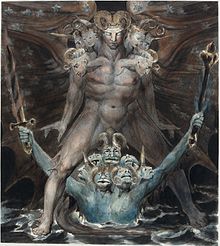
- Published in Gravity and Grace (1947)
- The Great Beast is the only object of idolatry, the only ersatz of God, the only imitation of something which is infinitely far from me and which is I myself.
- p. 121; footnote in Gravity and Grace edited by Gustave Thibon: To adore the "Great Beast" is to think and act in conformity with the prejudices and reactions of the multitude to the detriment of all personal search for truth and goodness.
- The collective is the object of all idolatry, this it is which chains us to the earth. In the case of avarice: gold is of the social order. In the case of ambition: power is of the social order. Science and art are full of the social element also. And love? Love is more or less of an exception: that is why we can go to God through love, not through avarice and ambition.
- p. 121
- A society like the Church, which claims to be Divine is perhaps more dangerous on account of the ersatz good which it contains then on account of the evil which sullies it.
Something of the social labelled divine: an intoxicating mixture which carries with it every sort of license. Devil disguised.- p. 122
- Conscience is deceived by the social. Our supplementary energy (imaginative) is to a great extent taken up with the social. It has to be detached from it. That is the most difficult of detachments.
- p. 123
- It is only by entering the transcendental, the supernatural, the authentically spiritual order that man rises above the social. Until then, whatever he may do, the social is transcendent in relation to him.
- p. 123
- Rome is the Great Beast of atheism and materialism, adoring nothing but itself. Israel is the Great Beast of religion. Neither one nor the other is likable. The Great Beast is always repulsive.
- p. 123; it should be noted that in this comment she is referring to the intolerant traditions of ancient Rome and ancient Israel, and not the modern entities, one of which did not yet exist at the time of her writing.
- The state of conformity is an imitation of grace.
By a strange mystery — which is connected with the power of the social element — a profession can confer on quite ordinary men in their exercise of it, virtues which, if they were extended to all circumstances of life, would make of them heroes or saints.
But the power of the social element makes these virtues natural. Accordingly they need a compensation.- p. 124
- But if Germany, thanks to Hitler and his successors, were to enslave the European nations and destroy most of the treasures of their past, future historians would certainly pronounce that she had civilized Europe.
- p. 124
- A Pharisee is someone who is virtuous out of obedience to the Great Beast.
- p. 125
Analysis of Oppression (1955)[edit]
- Published in "Reflections Concerning the Causes of Liberty and Social Oppression" in Oppression and Liberty (1955)
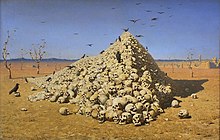
- The common run of moralists complain that man is moved by his private self-interest: would to heaven it were so! Private interest is a self-centered principle of action, but at the same time restricted, reasonable and incapable of giving rise to unlimited evils. Whereas, on the other hand, the law of all activities governing social life, except in the case of primitive communities, is that here one sacrifices human life — in himself and in others — to things which are only means to a better way of living. This sacrifice takes on various forms, but it all comes back to the question of power. Power, by definition, is only a means; or to put it better, to possess a power is simply to possess means of action which exceed the very limited force that a single individual has at his disposal. But power-seeking, owing to its essential incapacity to seize hold of its object, rules out all consideration of an end, and finally comes, through an inevitable reversal, to take the place of all ends. It is this reversal of the relationship between means and end, it is this fundamental folly that accounts for all that is senseless and bloody right through history. Human history is simply the history of the servitude which makes men — oppressed and oppressors alike — the plaything of the instruments of domination they themselves have manufactured, and thus reduces living humanity to being the chattel of inanimate chattels.
- p. 141
The Iliad or The Poem of Force (1940-1941)[edit]
- "L'Iliade ou le poeme de la force," first published in Les Cahiers du Sud, 1940


- La force, c'est ce qui fait de quiconque lui est soumis une chose. Quand elle s'exerce jusqu'au bout, elle fait de l'homme une chose au sens le plus littéral, car elle en fait un cadavre.
- Might is that which makes a thing of anybody who comes under its sway. When exercised to the full, it makes a thing of man in the most literal sense, for it makes him a corpse.
- in The Simone Weil Reader, p. 153
- La force qui tue est une forme sommaire, grossière de la force. Combien plus variée en ses procédés, combien plus surprenante en ses effets, est l'autre force, celle qui ne tue pas; c'est-à-dire celle qui ne tue pas encore.
- The might which kills outright is an elementary and coarse form of might. How much more varied in its devices; how much more astonishing in its effects is that other which does not kill; or which delays killing.
- in The Simone Weil Reader, p. 155
- Du pouvoir de transformer un homme en chose en le faisant mourir procède un autre pouvoir, et bien autrement prodigieux, celui de faire une chose d'un homme qui reste vivant.
- From the power to transform him into a thing by killing him there proceeds another power, and much more prodigious, that which makes a thing of him while he still lives.
- in The Simone Weil Reader, p. 155
- Une âme ... n'est pas faite pour habiter une chose ; quand elle y est contrainte, il n’est plus rien en elle qui ne souffre violence.
- The soul was not made to dwell in a thing; and when forced to it, there is no part of that soul but suffers violence.
- in The Simone Weil Reader, p. 155
- Si tous sont destinés en naissant à souffrir la violence, c'est là une vérité à laquelle l'empire des circonstances ferme les esprits des hommes.
- If all men, by the act of being born, are destined to suffer violence, that is a truth to which the empire of circumstances closes their minds.
- in The Simone Weil Reader, p. 163
- Le prestige, qui constitue la force plus qu'aux trois quarts, est fait avant tout de la superbe indifférence du fort pour les faibles, indifférence si contagieuse qu'elle se communique à ceux qui en sont l'objet.
- The prestige which constitutes three-fourths of might is first of all made up of that superb indifference which the powerful have for the weak, an indifference so contagious that it is communicated even to those who are its object.
- in The Simone Weil Reader, p. 168
- Once the experience of war makes visible the possibility of death that lies locked up in each moment, our thoughts cannot travel from one day to the next without meeting death's face. The mind is then strung up to a pitch it can stand for only a short time; but each new dawn introduces the same necessity; and days piled on days make years. On each one of these days the soul suffers violence. Regularly, each morning, the soul castrates itself of aspiration, for thought cannot journey through time without meeting death on the way. Thus war effaces all conceptions of purpose or goal, including even its own "war aims." It effaces the very notion of war's being brought to an end. Consequently, nobody does anything to bring this end about. In the presence of an armed enemy, what hand can relinquish its weapon? The mind ought to find a way out, but the mind has lost all capacity to so much as look outward. The mind is completely absorbed in doing itself violence. Always in human life, whether war or slavery is in question, intolerable sufferings continue, as it were, by the force of their own specific gravity, and so look to the outsider as though they deprived the sufferer of the resources which might serve to extricate him.
- p. 181
- Celui qui ignore à quel point la fortune variable et la nécessité tiennent toute âme humaine sous leur dépendance ne peut pas regarder comme des semblables ni aimer comme soi-même ceux que le hasard a séparés de lui par un abîme. La diversité des contraintes qui pèsent sur les hommes fait naître l'illusion qu'il y a parmi eux des espèces distinctes qui ne peuvent communiquer.
- He who does not realize to what extent shifting fortune and necessity hold in subjection every human spirit, cannot regard as fellow-creatures nor love as he loves himself those whom chance separated from him by an abyss. The variety of constraints pressing upon man give rise to the illusion of several distinct species that cannot communicate.
- p. 192
- Il n'est possible d'aimer et d'être juste que si l'on connaît l'empire de la force et si l'on sait ne pas le respecter.
- Moreover, nothing is so rare as to see misfortune fairly portrayed; the tendency is either to treat the unfortunate person as though catastrophe were his natural vocation, or to ignore the effects of misfortune on the soul, to assume, that is, that the soul can suffer and remain unmarked by it, can fail, in fact, to be recast in misfortune's image.
- p. 193
Void and Compensation (1947)[edit]
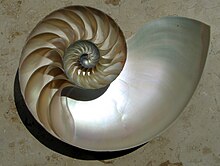
- Published in Gravity and Grace (1947)
- I also am other than what I imagine myself to be. To know this is forgiveness.
- p. 200
Attention and Will (1947)[edit]
- Published in Gravity and Grace (1947)
- Truth is sought not because it is truth but because it is good.
- p. 213
- We can know only one thing about God — that he is what we are not. Our wretchedness alone is an image of this. The more we contemplate it, the more we contemplate him.
- p. 216
- The recognition of human wretchedness is difficult for whoever is rich and powerful because he is almost invincibly led to believe that he is something. It is equally difficult for the man in miserable circumstances because he is almost invincibly led to believe that the rich and powerful man is something.
- p. 216
The Power of Words (1937)[edit]
- Published in Selected Essays 1934-1943 (1957)



- There is no area in our minds reserved for superstition, such as the Greeks had in their mythology; and superstition, under cover of an abstract vocabulary, has revenged itself by invading the entire realm of thought. Our science is like a store filled with the most subtle intellectual devices for solving the most complex problems, and yet we are almost incapable of applying the elementary principles of rational thought. In every sphere, we seem to have lost the very elements of intelligence: the ideas of limit, measure, degree, proportion, relation, comparison, contingency, interdependence, interrelation of means and ends. To keep to the social level, our political universe is peopled exclusively by myths and monsters; all it contains is absolutes and abstract entities. This is illustrated by all the words of our political and social vocabulary: nation, security, capitalism, communism, fascism, order, authority, property, democracy. We never use them in phrases such as: There is democracy to the extent that... or: There is capitalism in so far as... The use of expressions like "to the extent that" is beyond our intellectual capacity. Each of these words seems to represent for us an absolute reality, unaffected by conditions, or an absolute objective, independent of methods of action, or an absolute evil; and at the same time we make all these words mean, successively or simultaneously, anything whatsoever. Our lives are lived, in actual fact, among changing, varying realities, subject to the casual play of external necessities, and modifying themselves according to specific conditions within specific limits; and yet we act and strive and sacrifice ourselves and others by reference to fixed and isolated abstractions which cannot possibly be related either to one another or to any concrete facts. In this so-called age of technicians, the only battles we know how to fight are battles against windmills.
- p. 222
- "A man thinks he is dying for his country," said Anatole France, "but he is dying for a few industrialists." But even that is saying too much. What one dies for is not even so substantial and tangible as an industrialist.
- p. 224
- What a country calls its vital economic interests are not the things which enable its citizens to live, but the things which enable it to make war; petrol is much more likely than wheat to be a cause of international conflict. Thus when war is waged it is for the purpose of safeguarding or increasing one's capacity to make war. International politics are wholly involved in this vicious cycle. What is called national prestige consists in behaving always in such a way as to demoralize other nations by giving them the impression that, if it comes to war, one would certainly defeat them. What is called national security is an imaginary state of affairs in which one would retain the capacity to make war while depriving all other countries of it. It amounts to this, that a self-respecting nation is ready for anything, including war, except for a renunciation of its option to make war. But why is it so essential to be able to make war? No one knows, any more than the Trojans knew why it was necessary for them to keep Helen. That is why the good intentions of peace-loving statesman are so ineffectual. If the countries were divided by a real opposition of interests, it would be possible to arrive at a satisfactory compromise. But when economic and political interests have no meaning apart from war, how can they be peacefully reconciled?
- p. 224
- The aim is to replace economic oligarchies by the State, which has a will-to-power of its own and is quite as little concerned with the public good; and a will-to-power, moreover, which is not economic but military and therefore much more dangerous to any good folk who have a taste for staying alive. And on the bourgeois side what on earth is the sense of objecting to State control in economic affairs if one accepts private monopolies which have all the economic and technical disadvantages of State monopolies and possibly some others as well?
- p. 230
- The struggle between the opponents and defenders of capitalism is a struggle between innovators who do not know what innovation to make and conservatives who do not know what to conserve.
- p. 233
- The necessity for power is obvious, because life cannot be lived without order; but the allocation of power is arbitrary because all men are alike, or very nearly. Yet power must not seem to be arbitrarily allocated, because it will not then be recognized as power. Therefore prestige, which is illusion, is of the very essence of power.
- p. 235
Contradiction (1947)[edit]
- Published in Gravity and Grace (1947)

- An imaginary perfection is automatically at the same level as I who imagine it — neither higher nor lower.
- p. 240
Prerequisite to Dignity of Labour (1957)[edit]
- La Condition ouvrière (1951)
- It is not in a person's nature to desire what he already has. Desire is a tendency, the start of a movement toward something, toward a point from which one is absent. If, at the very outset, this movement doubles back on itself toward its point of departure, a person turns round and round like a squirrel in a cage or a prisoner in a condemned cell. Constant turning soon produces revulsion. All workers, especially though not exclusively those who work under inhumane conditions, are easily the victims of revulsion, exhaustion and disgust and the strongest are often the worst affected.
- p. 245
Detachment (1947)[edit]

- Published in Gravity and Grace (1947)
- We must leave on one side the beliefs which fill up voids and sweeten what is bitter. The belief in immortality. The belief in the utility of sin: etiam peccata. The belief in the providential ordering of events — in short the "consolations" which are ordinarily sought in religion.
- p. 258
- We should desire neither the immortality nor the death of any human being, whoever he may be, with whom we have to do.
- p. 260
- The miser deprives himself of his treasure because of his desire for it.
- p. 260
- If we love God while thinking that he does not exist, he will manifest his existence.
- p. 260
Love (1947)[edit]

- Published in Gravity and Grace (1947)
- If we want a love which will protect the soul from wounds we must love something other than God.
- p. 62
- God's love for us is not the reason for which we should love him. God's love for us is the reason for us to love ourselves.
- p. 270
- To desire friendship is a great fault. Friendship should be a gratuitous joy like those afforded by art or life. We must refuse it so that we may be worthy to receive it; it is of the order of grace.
- p. 274
- Désirer échapper à la solitude est une lâcheté. L'amitié ne se recherche pas, ne se rêve pas, ne se désire pas ; elle s'exerce (c'est une vertu).
Chance (1947)[edit]
- Published in Gravity and Grace (1947)
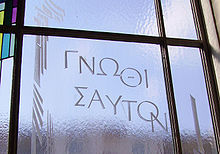
- Meditation on the chance which led to the meeting of my mother and father is even more salutary than meditation on death.
- p. 277
- Stars and blossoming fruit-trees: utter permanence and extreme fragility give an equal sense of eternity.
- p. 277
Waiting on God (1950)[edit]
- Various translations and editions exist, including those titled Waiting for God and Awaiting God
- The most important part of education — to teach the meaning of to know (in the scientific sense).
- The last statement in her notebook
- Humility consists of knowing that in this world the whole soul, not only what we term the ego in its totality, but also the supernatural part of the soul, which is God present in it, is subject to time and to the vicissitudes of change. There must be absolutely acceptance of the possibility that everything material in us should be destroyed. But we must simultaneously accept and repudiate the possibility that the supernatural part of the soul should disappear.
- "Concerning the Our Father" in Waiting on God (1972), Routledge & Kegan Paul edition, p. 153
- The key to a Christian conception of studies is the realization that prayer consists of attention. It is the orientation of all the attention of which the soul is capable toward God. The quality of the attention counts for much in the quality of the prayer. Warmth of heart cannot make up for it.
- "Reflections on the Right Use of School Studies with a View to the Love of God"
Reflections on the Right Use of School Studies with a View to the Love of God[edit]


- Although people seem to be unaware of it today, the development of the faculty of attention forms the real object and almost the sole interest of studies.
- School children and students who love God should never say: "For my part I like mathematics"; "I like French"; "I like Greek." They should learn to like all these subjects, because all of them develop that faculty of attention which, directed toward God, is the very substance of prayer.
- Attention consists of suspending our thought, leaving it detached, empty, and ready to be penetrated by the object; it means holding in our minds, within reach of this thought, but on a lower level and not in contact with it, the diverse knowledge we have acquired which we are forced to make use of.
- Above all our thought should be empty, waiting, not seeking anything, but ready to receive in its naked truth the object that is to penetrate it.
All wrong translations, all absurdities in geometry problems, all clumsiness of style, and all faulty connection of ideas in compositions and essays, all such things are due to the fact that thought has seized upon some idea too hastily, and being thus prematurely blocked, is not open to the truth.
- We do not obtain the most precious gifts by going in search of them but by waiting for them. Man cannot discover them by his own powers, and if he sets out to seek for them he will find in their place counterfeits of which he will be unable to discern falsity.
- The capacity to give one's attention to a sufferer is a very rare and difficult thing; it is almost a miracle; it is a miracle. Nearly all those who think they have this capacity do not possess it. Warmth of heart, impulsiveness, pity are not enough.
- Paradoxical as it may seem, a Latin prose or a geometry problem, even though they are done wrong, may be of a great service one day, provided we devote the right kind of effort to them. Should the occasion arise, they can one day make us better able to give someone in affliction exactly the help required to save him, at the supreme moment of his need.
Letter to a Priest (1951)[edit]

- When I read the catechism of the Council of Trent, it seems as though I had nothing in common with the religion there set forth.
- The Hebrews took for their idol, not something made of metal or wood, but a race, a nation, something just as earthly. Their religion is essentially inseparable from such idolatry, because of the notion of the "chosen people".
- Section 2
- Every time that a man has, with a pure heart, called upon Osiris, Dionysus, Buddha, the Tao, etc., the Son of God has answered him by sending the Holy Spirit. And the Holy Spirit has acted upon his soul, not by inciting him to abandon his religious tradition, but by bestowing upon him light — and in the best of cases the fullness of light — in the heart of that same religious tradition. … It is, therefore, useless to send out missions to prevail upon the peoples of Asia, Africa or Oceania to enter the Church.
- Section 8
- Besides, it is written that the tree shall be known by its fruits. The Church has borne too many evil fruits for there not to have been some mistake at the beginning. Europe has been spiritually uprooted, cut off from that antiquity in which all the elements of our civilization have their origin; and she has gone about uprooting the other continents from the sixteenth century onwards. Missionary zeal has not Christianized Africa, Asia and Oceania, but has brought these territories under the cold, cruel and destructive domination of the white race, which has trodden down everything. It would be strange, indeed, that the word of Christ should have produced such results if it had been properly understood.
- Section 9
Oppression and Liberty (1958)[edit]
- One could count on one's fingers the number of scientists in the entire world who have a general idea of the history and development of their own particular science; there is not one who is really competent as regards sciences other than his own. As science forms an indivisible whole, one may say that there are no longer, strictly speaking, any scientists, but only drudges doing scientific work. . . .
- p. 13 (as quoted in On Science, Necessity, and the Love of God (1968), p.1)
Lectures on Philosophy (1959)[edit]
- Leçons de philosophie (1959) as translated by Hugh Price (Cambridge: 1978)
- I too have a growing inner certainty that there is a deposit of pure gold in me which ought to be passed on. The trouble is that I am more and more convinced by my experience and observation of my contemporaries that there is no one to receive it.
- It's a dense mass. What gets added to it is of a piece with the rest. As the mass grows it becomes more and more dense. I can't parcel it out into little pieces.
- Letter from Simone Weil to her parents, August 1943, five weeks before her death, quoted in introduction, p. 1
- Any madness in us gains from being expressed, because in this way one gives a human form to what separates us from humanity.
- p. 76
- We have seen that language is something precious because it allows us to express ourselves; but it is fatal when one allows oneself to be completely led astray by it, because then it prevents one from expressing oneself. Language is the source of the prejudices and haste which Descartes thought of as the sources of error.
- p. 76
- The materialists say, it is by means of a series of straight lines more or less perfect that one imagines the perfect straight line as an ideal limit. That is right, but the progression in itself necessarily contains what is infinite; it is in relation to the perfect straight line that one can say that such and such a straight line is less twisted than some other. ... Either one conceives the infinite or one does not conceive at all.
- p. 87
- The first thing that we know about ourselves is our imperfection.
- This is what Descartes meant when he said: 'I know God before I know myself.'
- The only mark of God in us is that we feel that we are not God.
- p. 90
On Science, Necessity, and the Love of God (1968)[edit]

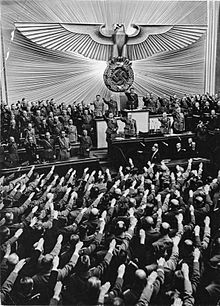



- Translated by R. Rees
- "Science affirms that ..." Science is voiceless; it is the scientists who talk.
- “Reflections on quantum theory,” p. 57
- My purpose here is to denounce an idea which seems to be dangerous and false. … Revolutionary trade unionists and orthodox communists are at one in considering everything that is purely theoretical as bourgeois. … The culture of a socialist society would be a synthesis of theory and practice; but to synthesize is not the same as to confuse together; it is only contraries that can be synthesized. … Marx’s principal glory is to have rescued the study of societies not only from Utopianism but also and at the same time from empiricism. … Humanity cannot progress by importing into theoretical study the processes of blind routine and haphazard experiment by which production has so long been dominated. … The true relation between theory and application only appears when theoretical research has been purged of all empiricism.
- “The teaching of mathematics,” p. 71-72
- Respectable scientists like de Broglie himself accept wave mechanics because it confers coherence and unity upon the experimental findings of contemporary science, and in spite of the astonishing changes it implies in connection with ideas of causality, time, and space, but it is because of these changes that it wins favor with the public. The great popular success of Einstein was the same thing. The public drinks in and swallows eagerly everything that tends to dispossess the intelligence in favor of some technique; it can hardly wait to abdicate from intelligence and reason and from everything that makes man responsible for his destiny.
- “Wave Mechanics,” p. 75
- Men … ask nothing better, it would seem, than to leave their destiny, their life, and all their thoughts in the hands of a few men with a gift for the exclusive manipulation of this or that technique.
- “Wave Mechanics,” p. 75
- There are necessities and impossibilities in reality which do not obtain in fiction, any more than the law of gravity to which we are subject controls what is represented in a picture. … It is the same with pure good; for a necessity as strong as gravity condemns man to evil and forbids him any good, or only within the narrowest limits and laboriously obtained and soiled and adulterated with evil. … The simplicity which makes the fictional good something insipid and unable to hold the attention becomes, in the real good, an unfathomable marvel.
- “Morality and literature,” pp. 160-161
- During the last quarter of a century all the authority associated with the function of spiritual guidance … has seeped down into the lowest publications. … Between a poem by Valéry and an advertisement for a beauty cream promising a rich marriage to anyone who used it there was at no point a breach of continuity. So as a result of literature’s spiritual usurpation a beauty cream advertisement possessed, in the eyes of little village girls, the authority that was formerly attached to the words of priests.
- “Morality and literature,” p. 164
- When, as a result of what was called Enlightenment in the eighteenth century, the priests had in fact almost entirely lost this function of guidance. Their place was taken by writers and scientists. In both cases it is equally absurd. Mathematics, physics, and biology are as remote from spiritual guidance as the art of arranging words. When that function is usurped by literature and science it proves there is no longer any spiritual life.
- “Morality and literature,” pp. 164-165
- It is not only in literature that fiction generates immorality. It does it also in life itself. For the substance of our life is almost exclusively composed of fiction. We fictionalize our future, and, unless we are heroically devoted to truth, we fictionalize our past, refashioning it to our taste. We do not study other people; we invent what they are thinking, saying, and doing. Reality provides us with some raw material, just as novelists often take a theme from a news item, but we envelop it in a fog in which, as in all fiction, values are reversed, so that evil is attractive and good is tedious.
- “Morality and literature,” pp. 161-162
- The essential characteristic of the first half of the twentieth century is the growing weakness, and almost the disappearance, of the idea of value.
- “The responsibility of writers,” p. 167
- Dadaism and surrealism … represented the intoxication of total license, the intoxication in which the mind wallows when it has made a clean sweep of value and surrendered to the immediate. The good is the pole towards which the human spirit is necessarily oriented, not only in action but in every effort, including the effort of pure intelligence. The surrealists have set up non-oriented thought as a model; they have chosen the total absence of value as their supreme value. Men have always been intoxicated by license, which is why, throughout history, towns have been sacked. But there has not always been a literary equivalent for the sacking of towns. Surrealism is such an equivalent.
- “The responsibility of writers,” p. 167
- Such words as spontaneity, sincerity, gratuitousness, richness, enrichment — words which imply an almost total indifference to contrasts of value — have come more often from their [the surrealists’] pens than words which contain a reference to good and evil. Moreover, this latter class of words has become degraded, especially those which refer to the good, as Valéry remarked some years ago. Words like virtue, nobility, honor, honesty, generosity, have become almost impossible to use or else they have acquired bastard meanings; language is no longer equipped for legitimately praising a man’s character.
- “The responsibility of writers,” p. 168
- In a general way, the literature of the twentieth century is essentially psychological; and psychology consists of describing states of the soul by displaying them all on the same plane, without any discrimination of value, as though good and evil were external to them, as though the effort toward the good could be absent at any moment from the thought of any man.
- “The responsibility of writers,” p. 168
- There is a certain kind of morality which is even more alien to good and evil than amorality is.
- “The responsibility of writers,” p. 169
Quotes about Weil[edit]

- Alphabetized by author







- In the interest of public security it would be advisable that this person be distanced from Le Puy, where she has never ceased to preach revolt.
- In her relatively short life, Simone Weil … created a body of work whose intellectual scope and acuity are remindful of religious thinkers such as Blaise Pascal or Søren Kierkegaard. Since no book by Simone Weil appeared in her lifetime and only a few of her writings were intended for publication, a noteworthy reception of her ideas took place only when selections of her notes, diaries and fragments began to be published posthumously after World War II.
- Simone Weil's intellectual and existential search encompassed several of the major religious and sapiential traditions. Since her religiosity was imbued by Greek thought, Gnosticism, Chinese wisdom, Christian mysticism, and Indian philosophy, it is not surprising that scholars have been especially attentive to her perceptive elaborations on the universal truths informing these — at first sight — hardly compatible spiritual world views.
- J. Edgar Bauer, in "Simone Weil: Kenotic Thought and "Sainteté Nouvelle" in The 2002 CESNUR International Conference : Minority Religions, Social Change, and Freedom of Conscience (June 2002)
- Given that only the religion of pervasive kenosis can be truly universal, no single historical individual can exhaust its fullness by virtue of his redemptive acts, and no religious institution can grasp and articulate its meaning by means of dogmatic or doctrinal teachings. In the last resort, it is in the name of religious universalism that Simone Weil calls for a reversion of historical Christianity to its origins as a religion of kenosis.
- J. Edgar Bauer, in "Simone Weil: Kenotic Thought and "Sainteté Nouvelle" in The 2002 CESNUR International Conference: Minority Religions, Social Change, and Freedom of Conscience (June 2002)
- Simone Weil, je le sais encore maintenant, est le seul grand esprit de notre temps et je souhaite que ceux qui le reconnaissent en reçoivent assez de modestie pour ne pas essayer d’annexer ce témoignage bouleversant.
Pour moi, je serais comblé si l’on pouvait dire qu’à ma place, et avec les faibles moyens don’t je dispose, j’ai servi à faire connaitre et à répandre son oeuvre dont on n’a pas encore mesuré tout le retentissement.- Simone Weil, I maintain this now, is the only great spirit of our times and I hope that those who realize this have enough modesty to not try to appropriate her overwhelming witnessing.
For my part, I would be satisfied if one could say that in my place, with the humble means at my disposal, I served to make known and disseminate her work whose full impact we have yet to measure.- Albert Camus, in a letter to Weil's mother in 1951.
- Variant translation: The only great spirit of our time.
- As quoted in Between the Human and the Divine: The Political Thought of Simone Weil (1988) by Mary G. Dietz, Introduction, p. xiv
- Simone Weil, I maintain this now, is the only great spirit of our times and I hope that those who realize this have enough modesty to not try to appropriate her overwhelming witnessing.
- In the last years of her life she worried that all beliefs, even religious ones, risk idolatry. Her insistence upon "a convention ratified by God" is another example of the thoroughly personal knowledge of God that she sought, and one gathers, believed herself to have attained. She seemed persuaded that under the auspices of the Church such personal knowledge simply does not come about; on the contrary, parishioners turn idolatrous and mistake a ritual, a habit, and alas, a social custom (to go to church on Sunday, say) for such a convention.
- Robert Coles, in Simone Weil : A Modern Pilgrimage (1989), p. 151
- Weil’s critique of modern science consists of two parts, the first directed at classical (Newtonian) science, the latter at contemporary science, especially twentieth-century relativity and quantum mechanics. In each, Weil detects a species of thoughtlessness or failure of that prayerful attention that marks all genuine study and intellectual accomplishment.
- Joseph K. Cosgrove, “Simone Weil’s Spiritual Critique of Modern Science: an Historical-Critical Assessment,” Zygon, vol. 43, no. 2 (June 2008), pp. 353-370
- The assimilation of algebra by mathematical physics, a process spanning the eighteenth and extending into the nineteenth century, exacerbates the implicit thoughtlessness of classical science by subordinating scientific cognition to symbolic formulae increasingly devoid of insight. In the process, a genuine encounter with natural necessity, revelatory of divine providence, is lost to science, Symbolic or algebraic physics represents the collectivization of thought, as it were, where science itself is rendered a technique of knowledge production and thought ceases to be the activity of any responsible individual. … This process reaches its logical conclusion in twentieth-century physics, where science is reduced finally to a form of symbolic manipulation the only value of which is predictive success and technological domination of nature.
- Joseph K. Cosgrove, “Simone Weil’s Spiritual Critique of Modern Science: an Historical-Critical Assessment,” Zygon, vol. 43, no. 2 (June 2008), pp. 353-370
- The reader of her work finds himself confronted by a difficult, violent and complex personality; and the assistance of those who have the advantage of long discussions or correspondence with her, especially those who are under the peculiar conditions of the last five years her life, will be a permanent value in the future. … After reading Waiting on God and the present volume I saw that I must try to understand the personality of the author and that the reading and re-reading of all her work was necessary for this slow process of understanding. In trying to understand her, we must not be distracted … by considering how far, and at what points we agree or disagree. We must simply expose ourselves to the personality of a woman of genius, of a kind of genius akin to that of the saints. … I cannot conceive of anybody's agreeing with all of her views, or of not disagreeing violently with some of them. But agreement and rejection are secondary: what matters is to make contact with a great soul. Simone Weil was one who might have become a saint. Like some who have achieved this state, she had greater obstacles to overcome, as well as greater strength for overcoming them, then the rest of us. A potential saint can be a very difficult person. I suspect that Simone Weil could be at times insupportable. One is struck, here and there, by contrast between an almost superhuman humility and what appears to be an almost outrageous arrogance.
- T. S. Eliot, in his Introduction to The Need for Roots (1949), p. vi
- In her political thinking she appears as a strong critic of both Right and Left; at the same time or truly a lover of order and hierarchy than even most of those who call themselves Conservative, and more truly a lover of the people than most of those who call themselves Socialist.
- T. S. Eliot, in his Introduction to The Need for Roots (1949), p. ix
- What she cared about was human souls. Her study of human rights and human obligations exposes the falsity of some of the verbiage still current which was used during the war to serve as a moral stimulant.
- T. S. Eliot, in his Introduction to The Need for Roots (1949), p. xiii
- I went through a stage in life when I was thirty-two or thirty-three years old-when I was very fascinated by the writings of Simone Weil. In the end, her religious philosophy left me where I was. But I felt that there was something there that answered to a need that I felt, my "need for roots" that she wrote about so marvelously. I couldn't find the same solution.
- 1979 and 1980 interview in Conversations with Nadine Gordimer edited by Nancy Topping Bazin and Marilyn Dallman Seymour (1990)
- Her life is almost a perfect blending of the Comic and the Terrible, which two things may be opposite sides of the same coin. In my own experience, everything funny I have ever written is more terrible than it is funny, or only funny because it is terrible, or only terrible because it is funny. Well Simone Weil's is the most comical life I have ever read about, and the most truly tragic and terrible.
- Flannery O'Connor, in a letter to "A" (24 September 1955), published in The Habit of Being : Letters of Flannery O'Connor (1979) edited by Sally Fitzgerald, p. 105
- By saying Simone Weil's life was both comic and terrible I am not trying to reduce it, but mean to be paying her the highest tribute I can, short of calling her a saint, which I don't believe she was. Possibly I have a higher opinion of the comic and terrible than you do. To my way of thinking it includes her great courage and to call her anything less would be to see here as merely ordinary. Of course, I can only say, as you point out, this is what I see, not, this is what she is — which only God knows.
- Flannery O'Connor, in a letter to "A" (30 September 1955), published in The Habit of Being : Letters of Flannery O'Connor (1979) edited by Sally Fitzgerald, p. 106
- I have read everything by Simone Weil, who was an extraordinary woman gifted with immense empathy. But I think she might have profited from some better advice. She was not physically strong and yet, in order to directly experience the struggle of working people, she undertook factory work that was too much for her. And she also fought in the Spanish Civil War and, being somewhat clumsy, stepped into a pail of boiling oil, was severely burned, and went to Portugal to recuperate. Later, she would eat only the minimal portion of food she believed was available to people in occupied France—a few potatoes perhaps. She had been diagnosed with tuberculosis, and this may well have contributed to her death. (Then, as you see her, she is more of an inspiration than a model.) EP: Yes, an inspiration. She could not have been a model for me because I am neither a genius nor a mystic and, like Leonora, I had children I loved and for whom I was responsible, so that even if I had discovered a vocation of this sort in myself, I could not have lived such an extreme life.
- Elena Poniatowska Interview with The Paris Review (2018)
- [By 1939] Simone Weil had developed a social and political awareness which it took the war and the German occupation to awaken in many French intellectuals and beyond which many of them, including Sartre, have never progressed.
- Sir Richard Rees, as quoted in Between the Human and the Divine: The Political Thought of Simone Weil (1988) by Mary G. Dietz, Introduction, p. xiii
- Simone Weil was one of the most remarkable women of the twentieth, or indeed of any other century. I have great sympathy for her, but sympathy is not necessarily congeniality. It would be easier to write of her if I liked what she had to say, which I strongly do not. …I think Simone Weil had both over- and under-equipped herself for the crisis which overwhelmed her — along, we forget, immersed in her tragedy, with all the rest of us. She was almost the perfectly typical passionate, revolutionary, intellectual woman — a frailer, even more highly strung Rosa Luxemburg. … She made up her own revolution out of her vitals, like a spider or silkworm. She could introject all the ill of the world into her own heart, but she could not project herself in sympathy to others. Her letters read like the more distraught signals of John of the Cross in the dark night.
- Although a few commentators have noted the influence of Simone Weil on the thought of Albert Camus, their relationship has never been fully explored … I shall examine several aspects of that influence in … Weil's critique of Marxism which Camus adopted in L'Homme Révolté… the conception of the rebel as an artisan which Camus also used in L'Homme Révolté, and … Weil's mysticism, to which Camus was reluctantly though definitely drawn. … I shall consider more fully the different conceptions of freedom and justice which appear in their writings and argue that their contributions to political thought here lay with their appreciation of the impulse in modern man to seek and impose absolute values. In this context, we shall see that Camus and Simone Weil provide different routes to individual authenticity and integrity in an absurd world.
- Fred Rosen, in "Marxism, Mysticism, and Liberty : The Influence of Simone Weil on Albert Camus", in Political Theory Vol. 7, No. 3 (August 1979), p. 301
- Most sins can be traced back to the social element. They spring from a thirst to appear and to dominate. It is not that Simone Weil rejects the social element as such; she knows that our environment, roots and traditions form bridges, metaxu between earth and heaven; what she repudiates is the totalitarian city — symbolized by the ‘Great Beast’ of Plato and the Beast of the Apocalypse — whose power and prestige usurp God’s place in the soul. Whether it shows itself under a conservative or a revolutionary aspect, whether it consists of adoring the present or the future city, social idolatry always tends to stifle and to replace the true mystic tradition. All the persecutions of prophets and saints are due to it; through it Antigone and Joan of Arc were condemned and Jesus Christ crucified. The social Beast offers man a substitute for religion which allows him to transcend his individuality without surrendering his self and so, at small cost, to dispense with God; a social imitation of the highest virtues is possible by which they are immediately degraded into pharisaism: "The pharisee is he who is virtuous out of obedience to the Great Beast."
- Gustave Thibon, on Weil's notions of metaxu, idolatry, and the "Great Beast" in the Introduction to Gravity and Grace (1947), as translated by Emma Crawford and Mario von der Ruhr (1952), p. xxix
- Light for the spirit and nourishment for the soul, Simone Weil’s work does not have to be brought "up to date," since it emanates from that summit of being which overhangs all times and places. How could one put a date on a particular thought by Plato or Marcus Aurelius, a verse by Aeschylus, or the utterance of a Shakespearean hero ? The same is true, and in exemplary fashion, for Simone Weil. True light does not fade, and a true fountain need never be replenished.
To speak of what is timeless is also to speak of what is universal. The undeserved privilege of presenting Simone Weil’s first book to the public has brought me countless favourable comments from the four corners of the globe. What strikes me most about these is that they come from individuals of such diverse backgrounds, social status, cultural milieu, etc, and that reading this work has left a deep impression on all their souls, as they found in it the revelation of an inner truth for which they had, up until then, been waiting in vain.
At the twilight of a century whose accelerated history has led to the rise and fall of so many idols, this book increasingly appears like a message from eternity, addressed to eternal man, this "Nothingness capable of God," who is enslaved by gravity and liberated by grace.- Gustave Thibon, in his Postscript to the 1991 edition of La Pesanteur et la grâce, as translated by Mario von der Ruhr
- I knew her very well, I have had long discussions with her. For a period of time she was more or less in sympathy with our cause, but then she lost faith in the proletariat and in Marxism. It's possible that she will turn toward the left again.
- Leon Trotsky, in a letter to Victor Serge (30 July 1936)
- Ca va faire, je pense, 23 ans que tu as fait ton entrée dans le monde phénoménal pour le plus grand emmerdement des recteurs et des directrices.
- It will now be I think 23 years that you made your entry into the phenomenal world to create the greatest pain in the ass for rectors and school directors.
- André Weil, her brother, in an a 1932 letter to Simone.
- It will now be I think 23 years that you made your entry into the phenomenal world to create the greatest pain in the ass for rectors and school directors.
External links[edit]
- SimoneWeil.net
- "Simone Weil: atheism as purification" at Religious Atheisms
- "Mathematics and the Love of God: An Introduction to the thought of Simone Weil" by Scott Taylor (a PDF document)
- The American Weil Society
- Letter of Simone Weil to Déodat Roché
- Simone Weil at The Question of God (PBS)
- "Simone Weil: 1909-1943" in Hermenaut (22 December 2000)
- "Simone Weil: A saint for our time?" - from The New Criterion (March 2002)
- "Simone Weil: Kenotic Thought and "Sainteté Nouvelle" by J. Edgar Bauer at the CESNUR International Conference : Minority Religions, Social Change, and Freedom of Conscience (June 2002)
- In Our Time : Simone Weil (BBC4 radio)
- Online texts (in French) at Wikilivres

